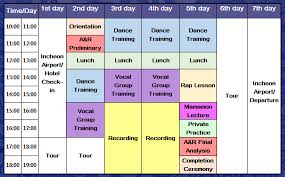Link to Maybe Not Organic but Definitely Real: Part 1
Maybe Not Organic but Definitely Real: Part 1, covered the three ways that people join a company and become a trainee. Already the task of becoming a Kpop or a South Korean entertainer in general (because of dancers, singers, actors, models, they all have to go through auditions, signing to companies and training) is off to a daunting and difficult start. One thing that may not have been made clear is that a contract must be signed with a company before a person can even be considered a trainee, let alone an idol, then the trainee enters the training period.
Training Period
To most people, the word training or trainee would ” a process by which a someone is taught skills that are needed for an art, profession or job,” or a preparation period, in trainee world, it’s a little different. Trainees practice and learn skills to be entertainers, but (and you’ll get tired of this phrase) there is a lot more to it. For the sake of saving time let’s look specifically at a Kpop idol’s training.
Long Training Period.
Some may wonder why Kpop idol hopefuls even need to go through a trainee period the answer is simple, companies will not let any trainee debut until they feel a trainee has either proven themselves in training or in the rare circumstance that the ideal group the company wanted the trainee to be a member of has already debut (for example Super Junior’s Kyuhyun).  An “average” training period for trainees is between 2 to 4 years, but it can be several more years or as short as a few months. Jo Kwon, who’s a member of the JYP group 2AM, was a trainee for 7 years before he was able to debut; however, Kyuhyun, a member of the SM group Super Junior, only trained for 3 months before debuting in the group. G.Soul, from JYP entertainment, was a trainee for 15 years and is now known as the Kpop idol with the longest training period before debuting. There is no such word as average when it comes to these companies.
An “average” training period for trainees is between 2 to 4 years, but it can be several more years or as short as a few months. Jo Kwon, who’s a member of the JYP group 2AM, was a trainee for 7 years before he was able to debut; however, Kyuhyun, a member of the SM group Super Junior, only trained for 3 months before debuting in the group. G.Soul, from JYP entertainment, was a trainee for 15 years and is now known as the Kpop idol with the longest training period before debuting. There is no such word as average when it comes to these companies.
The Schedule.
Trainees will take singing, dancing and acting lessons along with some language classes (most idols will learn either Japanese, Chinese, English, or Thai). The trainee life can be hard

because of the tight schedules depending on the age. Some trainees are students, so they’ll start training right after school; this means it the trainees may have their classes in school and then have singing and dancing classes. The training hours for trainees who are students “typically” start from whenever school classes are finished, to 10 pm. Other trainees may have a different schedule depending on the company they’re in. Some companies have trainees practice both before and after school, so wake up at 5 am, have a lesson, go to school, do some dedicated homework, have a company lesson, and be sure to finish the school homework from earlier plus the company homework these trainees are given and practice again sometimes until 1 a.m. in the morning. Most classes will last and an average of three hours, dance practices will last roughly five hours (not including the time spent practicing individually) and the company homework trainees are given, failure to not complete company homework or perform well in evaluations can lead to termination from the company.
Some companies have trainees practice both before and after school, so wake up at 5 am, have a lesson, go to school, do some dedicated homework, have a company lesson, and be sure to finish the school homework from earlier plus the company homework these trainees are given and practice again sometimes until 1 a.m. in the morning. Most classes will last and an average of three hours, dance practices will last roughly five hours (not including the time spent practicing individually) and the company homework trainees are given. A trainees’ failure to complete company homework or perform well in evaluations can lead to termination from the company.
Weight.
Aside from scheduling, trainees must also maintain certain weight requirements. Some will have to lose weight while others will have to work to maintain weight despite the intense work out that dance practice can be. On the darker side of Kpop, this means that they may not be able to eat certain foods (depending on which company they are in since each company may do things differently). It’s not like trainees and idols are left responsible for monitoring their weight themselves, some if not most companies usually check each trainee’s weight day-to-day to see if they’ve lost or kept their weight.
Distance from family.
Think back to foreign Kpop idols, even the ones from countries as close as Thailand and China. Not only throughout the training period but also throughout any part when an idol is promoting new content, it is almost impossible to contact their family. Trainees will find themselves lucky being able to sneak in an email, quick phone or maybe a Skype section but that one is unlikely. It is more often the case of the family needs to visit the trainee/idol (if they have time off their schedule); however, if a family member isn’t in well enough health to travel, it can be years before a trainee or idol sees their family. When these families finally meet again it can be heartbreaking yet heartwarming.
What is it all for?
The question is what is all of this for, who is gaining anything from this other than the companies? These trainees have demanding schedules, lesson/practices, most of the time they are separated from their families for extended periods of time, homework, dieting and weight restrictions. All of this for a matter of months to 15 years with no promise of even getting to debut. Any given moment a trainee or even an Idol could be told by their company “sorry you’re not marketable, you’re not learning, you’re not what we want anymore,” just like that no debut, just like that everything was for nothing and just like that no one will know that they even existed. They are monitored by their companies 24 hours a day to ensure that they’re not tarnishing the reputation of the company and staying marketable. So, why do these hopefuls put themselves through all this? Because they want to be singers.
The Kpop industry is formed differently than any other music industry, and to those of us that aren’t from South Korea or that haven’t delved deeper into the world of Korean entertainment, it seems strange and artificial. That thought isn’t wrong. members of a group/band will not have known one another before becoming trainees, the companies will already have an idea of what they want to do with each trainee, but just because South Korean singers don’t just show up overnight does not mean it’s not 100% real. It is really these trainees who become idols. And it is those idols who are dancing, it is really these idols who are singing and performing; it seems unreal because that is what Kpop formulated to be, as close to perfection deemed achievable. Kpop is designed to be successful companies like The Big Three made it that way.

